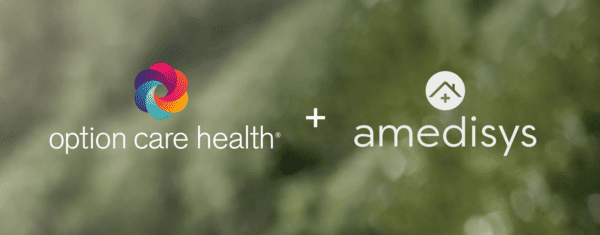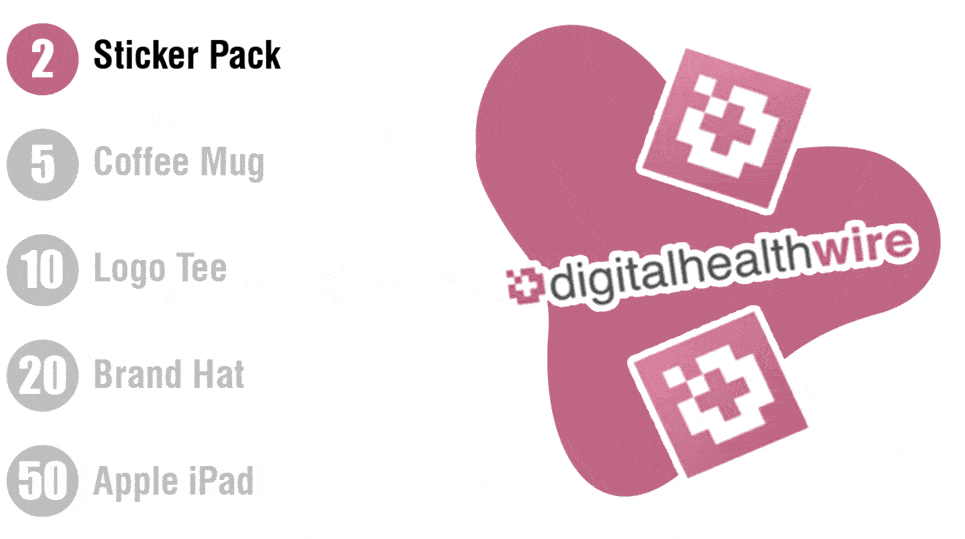|
Option Care Acquires Amedisys | DEA Extension
May 8, 2023
|
|
|

|
|
Together with
|

|
|
|
“Change creates opportunities.”
|
|
Amedisys Chairman Paul Kusserow
|
|

|
|
There’s a new home health giant on the block after infusion services provider Option Care Health shelled out $3.6B of stock to acquire in-home care and hospice company Amedisys.
The acquisition creates a massive entity specializing in nearly every type of home care, with over $6B in annual revenue between its 16k+ employees and 46 state footprint.
It’s worth mentioning that the initial analyst reaction to the merger was… not great. The news sent shares of Option Care’s stock sliding over 20% as investors grappled with Amedisys’ reliance on Medicare reimbursement that hasn’t been friendly to home health.
Option Care is one of the largest providers of home and alternate site infusion services, with nearly all of its revenue (88%) stemming from commercial health plans.
Amedisys ranks among the nation’s top independent providers of home health services, offering everything from nursing to hospice. It’s also a major hospital-at-home player thanks to its 2021 acquisition of Contessa Health. A majority of Amedisys’ revenue (76%) comes from Medicare and other government plans.
Combining the two is expected to reduce costs by $50M right out of the gate, due primarily to tech-enabled efficiencies, an optimized geographic footprint, and realigning costs through combined purchasing volumes.
- Revenue is also projected to increase by ~$25M through enhanced care coordination across each company’s respective patient base, as well as new programs. That’s about a 4% increase over the $622M the businesses generated last year.
Although a one-stop home health provider looks good on paper, the mixed response centered around Medicare’s recent reimbursement cuts for in-home therapies, with more cuts likely on the horizon in next month’s proposed rule for 2024.
- That’s on top of the ongoing shift to Medicare Advantage and its meaningfully lower rates, not to mention the acquisition arrives just two months into Richard Ashworth’s tenure as Amedisys CEO.
The Takeaway
Regardless of the timing, combining Amedisys’ home health and hospice solutions with Option Care’s alternate site infusion services creates a juggernaut in-home provider at a time when healthcare continues to move away from the hospital. The combined business undoubtedly has a more diversified payor mix than either one independently, and the leadership team believes the synergies and joint negotiating power will more than offset any reimbursement headwinds. Time will tell.
|




|
|
Clear Arch Health Unlocks Turnkey Virtual Care
Clear Arch Health’s turnkey remote patient monitoring and PERS solutions are fully customizable to meet the unique needs of every organization. Discover how Clear Arch Health is helping hospitals, physicians groups, and home health agencies effectively manage patient care – whenever and wherever it’s needed.
|
|
The New Staffing Landscape With connectRN
Flexibility is a key component of enabling nurses to deliver their best care without getting burned out. In this Digital Health Wire Q&A, we sat down with connectRN CEO Ted Jeanloz to discuss technology’s role in solving healthcare’s staffing challenges and the new ways that human-centered design can help support nurses.
|
|
Upgrade Your Prescribing Workflows
Whether you’re a care delivery organization or building products that have prescribers, there’s no need to build your prescribing workflow from scratch. Find out how connecting your prescribers to clinical decision support powered by real-time drug data can help provide the patient-centered insights needed for medication success.
|
|
- DEA Extends Prescribing Flexibility: After receiving a record 38k comments on its proposed rule rolling back prescribing flexibilities with the end of PHE on May 11th, the DEA is extending the waiver of the in-person exam requirement for an additional six months. The extra time gives the DEA room to address concerns related to continuity of care, particularly for patients with opioid use disorder who have initiated treatment from a virtual provider and would have otherwise had to stop treatment before getting an in-person consult.
- Healthy.io Closes $50M: Home diagnostics company Healthy.io closed $50M in Series D funding (total raised now $140M) following the FDA approval of its chronic kidney disease testing kit that uses a urine sample and a smartphone camera to eliminate the need for an in-person lab visit. The Israeli startup will use the funds to advance commercialization in the US, although it will do so after parting ways with about 70 employees (⅓ of its headcount).
- Health-Related Social Needs in Diabetics: A study of 21.5k Medicare Advantage beneficiaries with type 2 diabetes found that 56.9% had at least one health-related social need (HRSN). The most common HRSNs were financial strain (73.6%), food insecurity (47.5%), and poor housing quality (39.1%). Patients who lacked transportation or were lonely were more likely to visit the ED, while food insecurity was most consistently linked to higher acute care utilization.
- Psychedelic Medicine Milestone: Last week saw what might be the biggest milestone to-date along psychedelic therapies’ path toward FDA approval, with AMA approving the category’s first-ever CPT III code. The application for the code was a collaboration between MAPS (a PBC spearheading clinical trials for MDMA-assisted psychotherapy) and COMPASS Pathways (developer of a proprietary psilocybin-alternative). The full details of the code are expected to be released in July before going into effect at the start of next year.
- Tia Mental Health Programs: Hybrid women’s healthcare provider Tia is adding Groups and Coaching to its suite of behavioral health services, which include mental health assessments, medication management, and acupuncture. Groups is an eight-week program designed to drive connection with other women facing similar challenges, while Coaching is a 50-minute appointment to address stress-related issues. The new programs fill the gap left behind by the cancellation of Tia’s 1v1 therapy program earlier this year.
- MA Reaches Half of Eligible Beneficiaries: For the first time ever, Medicare Advantage enrollees now account for over half of all Medicare beneficiaries, according to a new KFF analysis. Of the 59.8M people with Medicare Part A and Part B in January, 30.2M were enrolled in private MA plans, which frequently carry advantages such as included vision, hearing, and dental coverage, as well as lower OOP costs compared to traditional Medicare without supplemental coverage.
- Casana’s Heart Seat Clearance: Casana announced the FDA clearance of its Heart Seat smart toilet seat, which uses embedded biometric sensors to measure users’ heart rate and oxygen saturation in a way that doesn’t require any behavior change. Armed with $30M in Series B funding from last year, Casana will pursue additional FDA clearances – including systolic and diastolic blood pressure monitoring – before beginning its commercial launch in late 2023.
- Mounjaro Trial Success: Results from Eli Lilly’s SURMOUNT-2 trial are in, and they further confirmed that its GLP-1 agonist tirzepatide (aka Mounjaro) drives meaningful weight loss among obese or overweight adults with type 2 diabetes. The trial had 938 adults take 10mg or 15mg of tirzepatide or a placebo over 72 weeks, finding that the GLP-1 groups achieved significantly greater average weight loss (13.4% & 15.7% vs. 3.3% of body weight) and had far more participants lose at least 15% of body weight (41.4% & 51.8% vs. 2.6%).
- Inbox Health Series B: Inbox Health raised a $22.5M Series B round (total funding now $45M) to help more patients settle medical bills through their preferred channel, whether text, email, or live chat. The platform is already used by over 2,600 US medical practices to help patients navigate one of healthcare’s most complex components while streamlining their own administrative processes.
- Horizon Taps Solera: New Jersey’s largest payor Horizon Healthcare Services has entered a multi-year strategic partnership with Solera Health to help connect its 3.6M members to a personalized network of digital point solutions. Horizon will leverage Solera’s AI-driven engagement tools to enroll members in best-fit solutions for MSK conditions, stress, sleep, resilience, tobacco cessation, and obesity.
- Black Americans’ Cardiology Deserts: One in three Black Americans, or roughly 16.8M people, live in US counties with little or no access to cardiologists, including over 2M individuals who reside in “cardiology deserts” with no cardiologists at all. That’s from a new GoodRx report, which also found that 70% of the counties with large Black populations in the Southeast US qualified as cardiology deserts, exacerbating the fact that people in those counties generally have higher cardiovascular disease risk factors.
|
|
Clinical Documentation Integrity For VBC
The growing use of risk-adjusted reimbursement in outpatient settings means clinical documentation needs to keep up, or health systems risk leaving revenue on the table. Check out Nuance’s new blog to learn how shifting reimbursement models make clinical documentation excellence more important than ever, and how AI can help you achieve it.
|
|
Glooko Outcomes Using Real-World Data
Modern diabetes management requires personalized, always-on, and connected care. Explore Glooko’s latest clinical studies to see how remote patient monitoring is making real-word improvements across multiple glycemic outcomes.
|
|
Maximize Provider Administration by Minimizing Manual Tasks
Automated provider credentialing, payor enrollment, and continuous monitoring – all under one roof. Discover how Medallion’s all-in-one platform is helping health systems maximize their provider administration by minimizing manual tasks.
|
|
|
Share Digital Health Wire
|
|
Spread the news & help us grow ⚡
|
|
Refer colleagues with your unique link and earn rewards.
|

|
|
|
|
Or copy and share your custom referral link: *|SHAREURL|*
|
|
You currently have *|REFERRALS|* referrals.
|
|
|
|
|